Letter Of Sympathy And Encouragement
[Your Name]
[Your Address]
[City, State, Zip Code]
[Email Address]
[Phone Number]
[Date]
[Recipient's Name]
[Recipient's Address]
[City, State, Zip Code]
Dear [Recipient's Name],
I am writing to extend my deepest sympathies and offer words of encouragement during this challenging time. I understand that you have been going through a difficult period, and I want you to know that you are not alone in this journey.
Grieving and facing adversity can be overwhelming, and it is okay to feel a range of emotions. Remember that it is essential to give yourself time and space to process these feelings. Know that I am here for you whenever you need someone to talk to or lean on for support.
While we cannot erase the pain you are experiencing, please find comfort in the knowledge that there are people who care deeply about you and your well-being. Surround yourself with loved ones who can provide comfort and understanding, and don't hesitate to ask for help when needed.
In times of difficulty, it is important to take small steps towards healing and rebuilding. Focus on taking care of yourself, both physically and emotionally. Allow yourself moments of respite and find solace in activities that bring you peace and joy.
Remember that healing is not a linear process, and it is okay to have setbacks along the way. Each step, no matter how small, is a testament to your strength and resilience. You are capable of overcoming this hardship, and I believe in your ability to find the light in the darkness.
Whenever you feel ready, consider seeking professional support, such as counseling or therapy, to help navigate through this difficult time. Speaking with a trained professional can provide valuable insights and coping strategies to assist you in your healing journey.
I am sending you positive thoughts and heartfelt prayers for your well-being and recovery. Take each day at your own pace, and know that you have the strength within you to overcome these challenges. Lean on the love and support of those around you, and remember that I am just a phone call away.
May you find peace and solace in the days ahead, and may your spirit find the courage to emerge even stronger from this trying time.
With deepest sympathy and encouragement,
[Your Name]
Bereavement and Loss of Loved One
Dear [Name],
I was deeply saddened to learn about the passing of [deceased's name]. Please know that my thoughts and prayers are with you and your family during this incredibly difficult time.
[Deceased's name] was such a remarkable person who touched the lives of everyone they met. I will always remember [specific memory or quality about the deceased]. Their kindness, wisdom, and generous spirit will never be forgotten.
While words cannot take away the pain you're feeling right now, please know that you are not alone. Your friends and family are here to support you through this journey of grief. Take all the time you need to heal, and remember that it's okay to feel whatever emotions come your way.
If there's anything at all I can do to help – whether it's bringing meals, running errands, or simply being someone to talk to – please don't hesitate to reach out. I'm here for you.
With deepest sympathy and love,
[Your name]
Job Loss or Career Setback
Subject: You've Got This - Better Opportunities Ahead
Dear [Name],
I heard about the recent changes at [company name], and I wanted to reach out to let you know that I'm thinking of you during this transition period.
While this news must feel overwhelming right now, I want you to know that I have complete confidence in your abilities and resilience. Throughout our professional relationship, I've witnessed your exceptional skills, dedication, and innovative thinking firsthand.
This setback, though challenging, often opens doors to even better opportunities. Your talent and experience are valuable assets that any organization would be fortunate to have. Use this time to reflect on what you truly want in your next role and remember that sometimes the best career moves come from unexpected circumstances.
I'm happy to serve as a reference, help with networking connections, or review your resume whenever you're ready. The job market recognizes quality, and you certainly have that in abundance.
Keep your head up – I'm rooting for you.
Best regards,
[Your name]
Serious Illness or Medical Diagnosis
Dear [Name],
I recently learned about your diagnosis, and I wanted you to know that you're in my thoughts and prayers every single day.
I know this news has turned your world upside down, and the uncertainty must feel overwhelming. Please know that you don't have to face this battle alone. Your strength and courage have always inspired those around you, and I have no doubt you'll approach this challenge with the same determination.
Medical advances have come so far, and I'm hopeful that your treatment plan will be successful. Remember to take things one day at a time and be patient with yourself as you navigate this journey.
Your family and friends are rallying around you, ready to provide support in whatever way you need. Whether it's help with daily tasks, transportation to appointments, or simply someone to listen, we're all here for you.
Please don't hesitate to let me know how I can help. I'm sending you all my love and positive energy.
With hope and friendship,
[Your name]
Divorce or Relationship Breakdown
Hey [Name],
I heard about what you're going through, and I just wanted to check in on you. I know this must be an incredibly tough time, and my heart goes out to you.
Breakups and divorces are never easy, even when they're the right decision. It's completely normal to feel a whole mix of emotions right now – sadness, anger, relief, fear about the future. Give yourself permission to feel whatever comes up.
I want you to know that this doesn't define you or your worth. You're an amazing person with so much to offer, and while it might not feel like it right now, there are brighter days ahead. This is a chance for a fresh start and to rediscover who you are outside of this relationship.
I'm here if you need someone to talk to, vent to, or just sit in comfortable silence with. We could grab coffee, go for a walk, or I could bring over some ice cream and terrible movies – whatever feels right.
You're stronger than you know, and you're going to get through this.
Lots of love,
[Your name]
Academic or Professional Failure
Subject: This Setback Doesn't Define Your Future
Dear [Name],
I know you're disappointed about [specific situation – exam results, project outcome, etc.], and I wanted to reach out to remind you of something important: one setback does not determine your entire future.
I understand how frustrating and disheartening this must feel, especially after all the hard work and effort you put in. Your disappointment is completely valid, and it's okay to feel upset about this outcome.
What I admire about you is your dedication and persistence. These qualities haven't disappeared because of this one result. Some of the most successful people I know have stories of initial failures that eventually led them to their greatest achievements.
Use this experience as a learning opportunity. Analyze what happened, identify areas for improvement, and create a plan moving forward. Sometimes these challenges reveal strengths we didn't know we had and teach us resilience we'll need later in life.
Your potential hasn't diminished, and I believe in your ability to bounce back from this stronger than before. Take some time to regroup, then come back with renewed determination.
You've got this!
[Your name]
Financial Hardship or Bankruptcy
Dear [Name],
I wanted to reach out after hearing about the financial challenges you're facing. I know these situations can feel isolating and overwhelming, but please know that you have people who care about you and want to help.
Financial setbacks happen to good, hardworking people, and they don't reflect your character or worth as a person. These circumstances are temporary, even though they might not feel that way right now.
I admire your courage in facing this situation head-on rather than hiding from it. That takes real strength and maturity. While the road ahead might seem daunting, you have the intelligence and determination to work through this step by step.
If you're open to it, I'd be happy to help in practical ways – whether that's helping you research resources, assisting with budgeting, or connecting you with people who've navigated similar situations. Sometimes a fresh perspective can help identify solutions we might miss when we're in the thick of things.
Remember that this chapter of your life isn't the whole story. You have the power to write a comeback, and I'll be cheering you on every step of the way.
With support and friendship,
[Your name]
Mental Health Struggles
Dear [Name],
I've noticed you haven't been yourself lately, and I wanted you to know that I'm here for you, no questions asked.
Mental health struggles are real and valid, and there's absolutely no shame in what you're going through. Your feelings matter, and you deserve support and understanding during this difficult time.
I want you to know that you're not a burden, you're not broken, and you're not alone. So many people care about you, even when your mind tells you otherwise. The dark thoughts and feelings you're experiencing aren't facts about who you are or what your future holds.
Please consider reaching out to a professional who can provide the specialized support you deserve. Therapy isn't a sign of weakness – it's a tool for healing and growth. I'm happy to help you research options or even go with you to an appointment if that would help.
In the meantime, remember to be gentle with yourself. Take things one day at a time, and celebrate small victories. Your mental health is just as important as your physical health.
I'm here whenever you need someone to listen without judgment.
With love and understanding,
[Your name]
What Are Letters of Sympathy and Encouragement and Why Do You Need Them
Letters of sympathy and encouragement serve as vital forms of emotional support during life's most challenging moments. These communications express care, understanding, and hope to individuals facing difficult circumstances such as loss, illness, setbacks, or major life transitions. The primary purpose is to let recipients know they are not alone, that their feelings are valid, and that better days lie ahead. These letters bridge the gap when physical presence isn't possible and provide lasting comfort that recipients can return to during particularly difficult moments.
Who Should Send Letters of Sympathy and Encouragement
- Family members offering support during crises or major life changes
- Close friends who want to provide emotional comfort and practical support
- Colleagues and professional contacts addressing workplace challenges or career setbacks
- Community leaders, teachers, or mentors supporting those in their care
- Healthcare providers following up with patients facing difficult diagnoses
- Religious or spiritual leaders offering faith-based comfort and guidance
- Anyone who has experienced similar challenges and can offer hope through shared experience
When to Send Letters of Sympathy and Encouragement
- Bereavement: Death of family members, friends, or beloved pets
- Health crises: Cancer diagnoses, chronic illness, mental health struggles, or serious injuries
- Professional setbacks: Job loss, business failure, academic disappointments, or career transitions
- Relationship challenges: Divorce, breakups, family conflicts, or custody battles
- Financial hardships: Bankruptcy, foreclosure, or significant financial loss
- Life transitions: Retirement challenges, empty nest syndrome, or major relocations
- Personal struggles: Addiction recovery, legal troubles, or identity crises
- Natural disasters: Loss of home, property damage, or displacement
- Anniversary dates: Marking difficult anniversaries or remembrance occasions
Elements and Structure That Must Be Included
- Acknowledgment: Recognize the specific situation without being overly detailed
- Validation: Confirm that their feelings and reactions are normal and acceptable
- Personal connection: Share a relevant memory, quality you admire, or personal experience
- Offer of support: Be specific about how you can help rather than generic offers
- Hope and encouragement: Provide realistic optimism about the future
- Closing sentiment: End with warmth and reaffirm your availability
- Professional letters: Include contact information and follow-up timeline
- Avoid: Platitudes like "everything happens for a reason" or minimizing their pain
How to Write and Send These Letters Effectively
- Research the situation: Understand the circumstances without being intrusive
- Choose your medium: Handwritten letters feel more personal; emails allow for quicker delivery
- Use appropriate timing: Send within days of learning about the situation, not weeks later
- Personalize the message: Reference specific details about the person and situation
- Be authentic: Write in your own voice rather than copying generic templates
- Proofread carefully: Errors can detract from the sincerity of your message
- Include practical elements: Phone numbers, specific dates, or concrete offers of help
- Consider follow-up: Plan additional check-ins rather than one-time communications
Formatting Guidelines and Best Practices
- Length: 150-300 words for most situations; longer for close relationships or complex circumstances
- Tone: Match the severity of the situation - formal for professional contexts, warm and casual for personal relationships
- Structure: Opening acknowledgment, body with support/encouragement, closing with specific offer of help
- Language: Use "I" statements to avoid assumptions; avoid religious references unless appropriate
- Delivery method: Handwritten for traditional sympathy; email for immediate support needs
- Timing: Send within 3-7 days of learning about the situation
- Follow-up: Plan additional contact within 2-4 weeks depending on the situation
Common Mistakes to Avoid When Writing
- Minimizing their pain with phrases like "at least" or "it could be worse"
- Making it about yourself by sharing your own lengthy experiences
- Offering empty platitudes instead of genuine, specific support
- Being too general rather than addressing their specific situation
- Promising what you can't deliver in terms of support or assistance
- Using inappropriate humor or trying to "cheer them up" prematurely
- Asking too many questions about details they may not want to share
- Sending form letters that don't reflect your actual relationship
- Poor timing - sending too late or during inappropriate moments
- Forgetting to follow up when you've promised continued support
After Sending - Follow-up Actions Required
- Professional contexts: Schedule follow-up contact within 1-2 weeks to check on progress
- Personal relationships: Reach out again within 2-4 weeks with specific offers of help
- Bereavement situations: Remember anniversary dates and important holidays
- Health challenges: Check in periodically about treatment progress and needs
- Document your outreach to ensure consistent support over time
- Be patient with responses - recipients may not reply immediately or at all
- Respect boundaries if they indicate they need space
- Continue practical support beyond the initial emotional support
- Acknowledge their strength when you see signs of recovery or progress
Advantages and Disadvantages of Sending These Letters
Advantages:
- Provides lasting comfort that recipients can revisit
- Shows genuine care and maintains relationships
- Offers practical support and concrete help
- Can inspire hope during dark periods
- Creates connection when physical presence isn't possible
Disadvantages:
- Risk of saying the wrong thing or causing unintended pain
- May feel inadequate compared to in-person support
- Can create pressure for recipients to respond
- Timing challenges may make letters feel inappropriate
- May raise expectations for ongoing support you can't maintain
Tips and Best Practices for Maximum Impact
- Write from the heart rather than following rigid templates
- Use specific details about the person and your relationship
- Offer concrete help like "I'll bring dinner Tuesday" rather than "let me know if you need anything"
- Share relevant memories that highlight positive qualities or experiences
- Follow their lead on communication preferences and frequency
- Keep copies of what you send for appropriate follow-up
- Consider cultural sensitivity regarding grief, religion, and family dynamics
- Include your contact information even if they already have it
- Be consistent with follow-up rather than sporadic contact

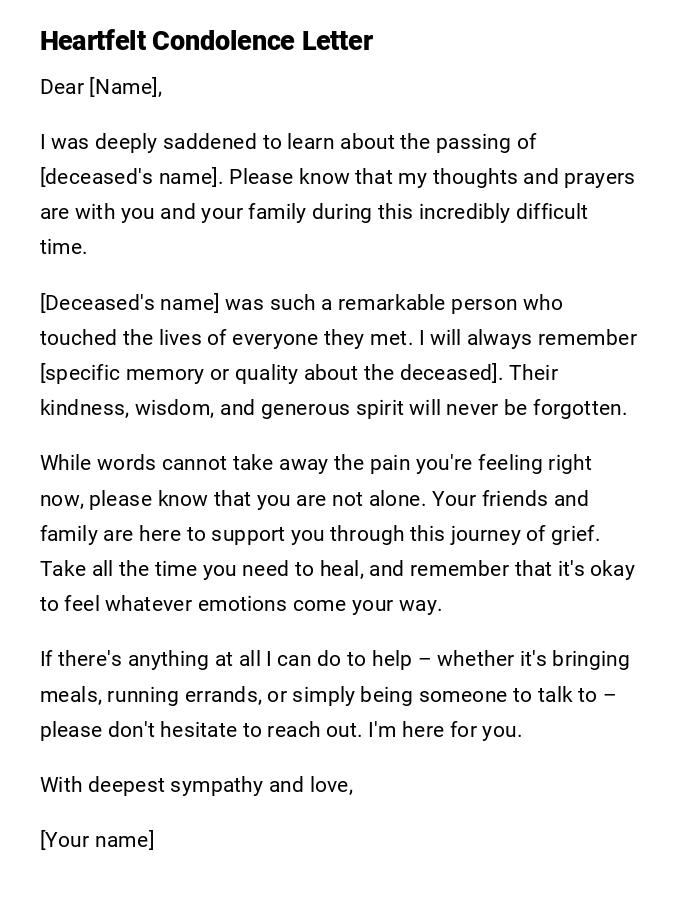
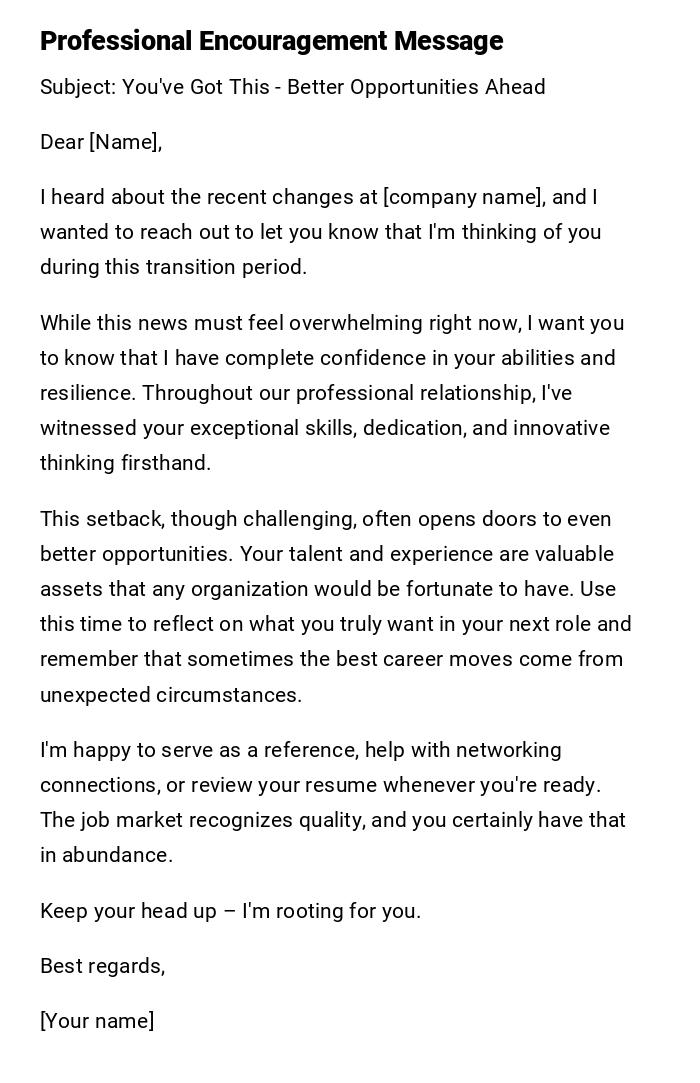
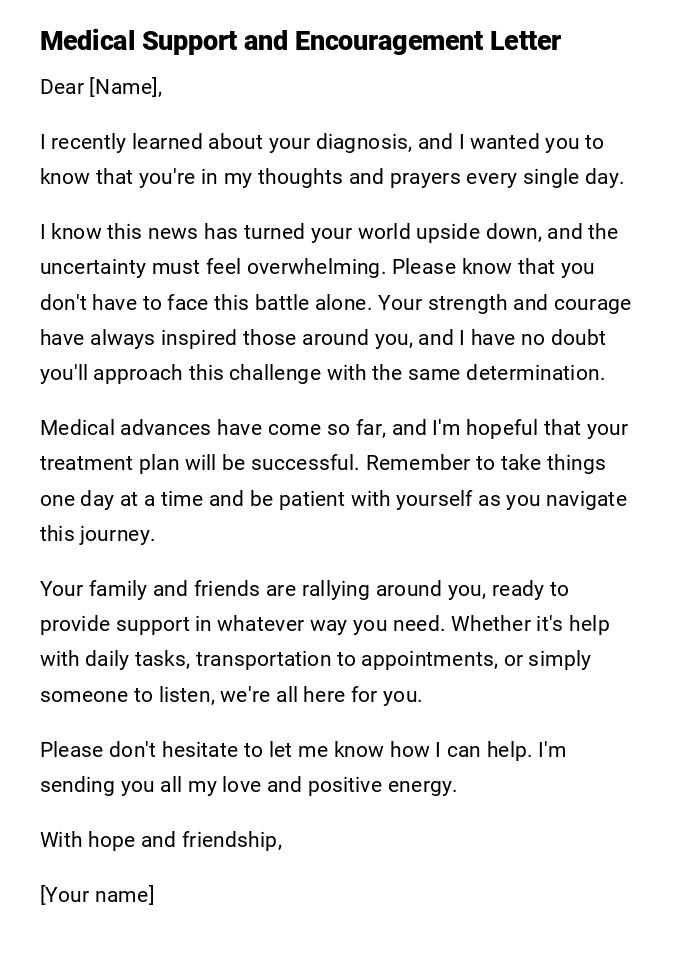
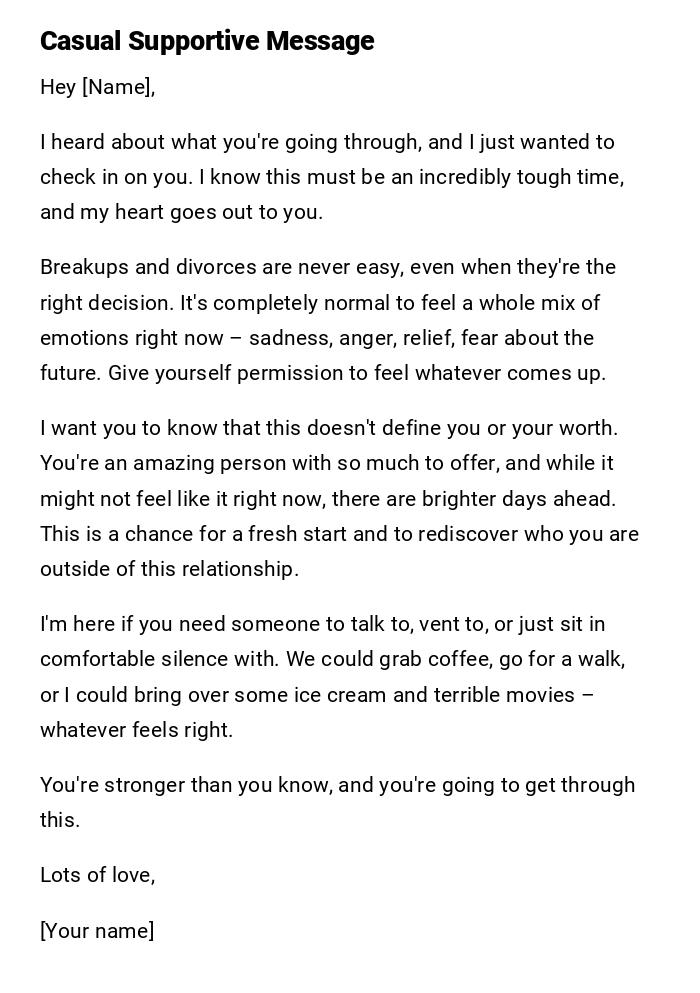
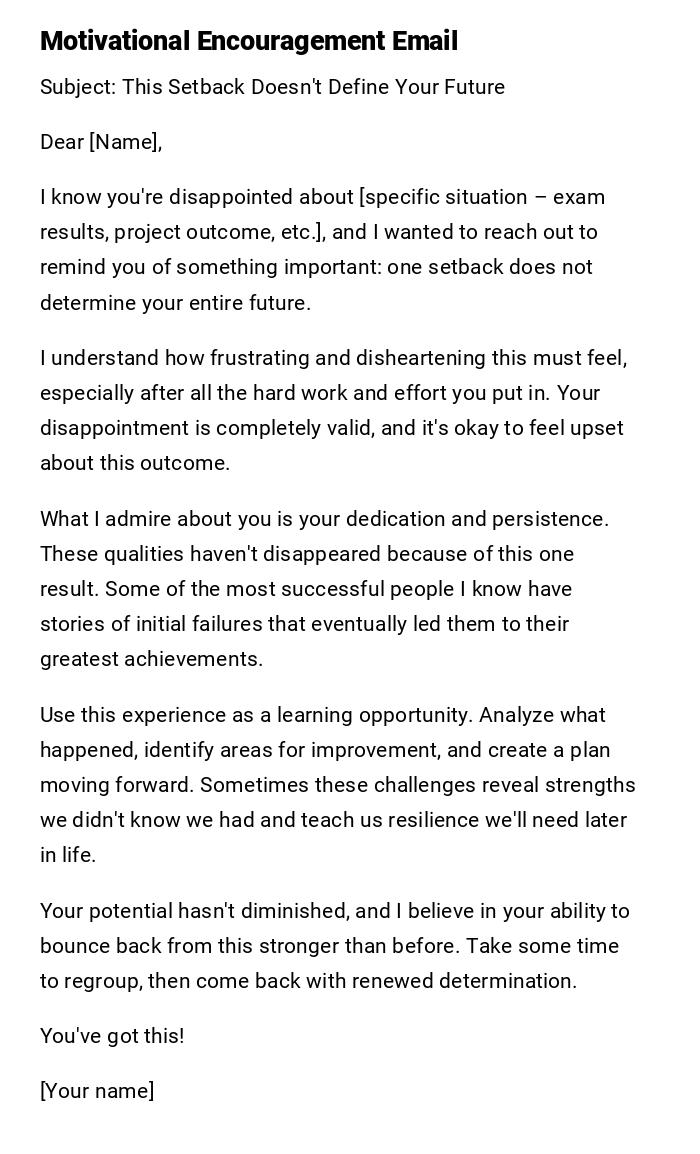
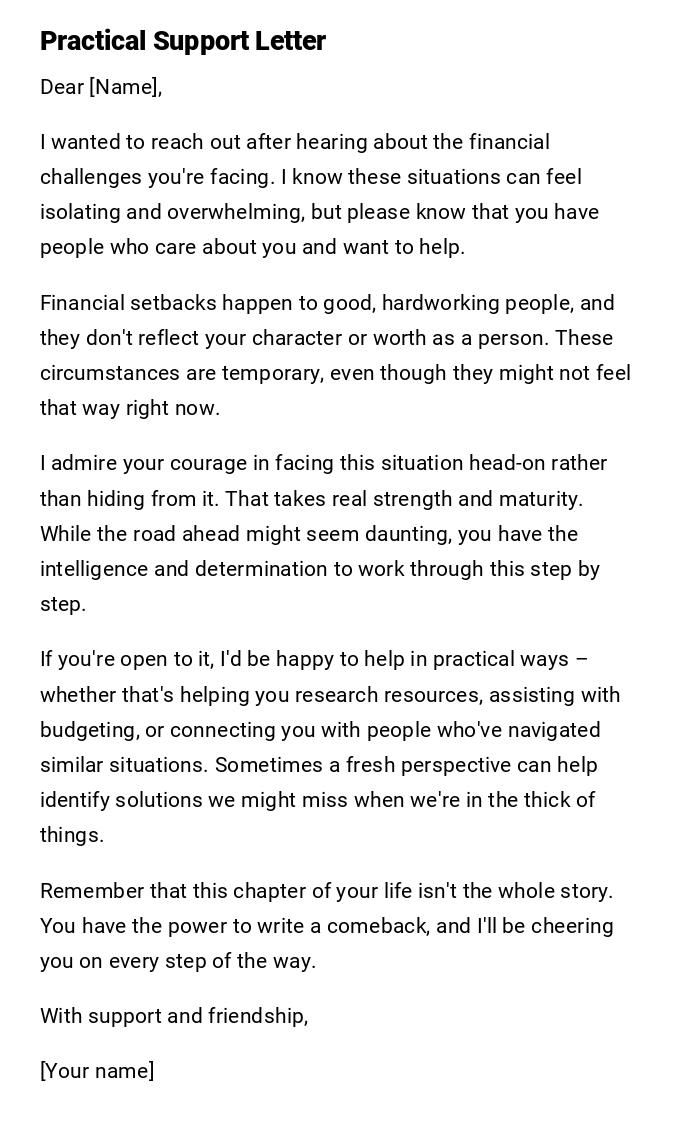
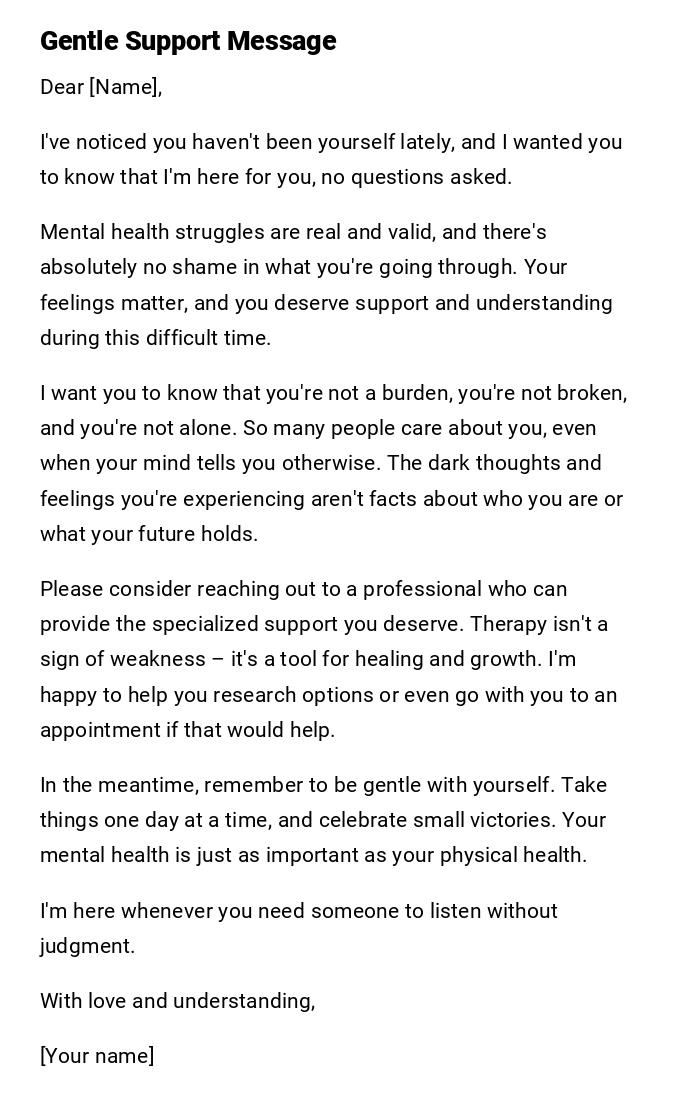

 Download Word Doc
Download Word Doc
 Download PDF
Download PDF